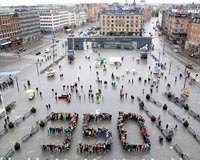| . |  |
. |
Copenhagen (AFP) Dec 21, 2009 As the world takes stock of the 11th-hour climate deal hammered out in the Danish capital, many diplomats and experts are asking if injecting leaders into the negotiating process was, on balance, a boon or a blunder. The question is pertinent, because it is now all too clear that the Copenhagen Accord was not the planet-saving end point once advertised. Rather, it has become just another way station on the long and winding road toward what most countries claim to want: a legally-binding treaty to beat back the terrible threat of global warming. Now negotiators and NGOs alike are pinning their hopes on the next big climate rendezvous a year from now, in Mexico City. Many argue that having world leaders at the table is what saved the day in Copenhagen, even if the end result fell worryingly short of what science says is needed. "Before the heads of state arrived, we were done for," said Brice Lalonde, France's climate ambassador. "They took risks, some worked all night. They really rolled up their sleeves," he told AFP. "I think it's the first time that leaders have really lived up to their responsibilities" on climate, added Lalonde, who stands astride the forbiddingly technical talks and top-level geo-strategic dialogue. Robert Orr, Assistant Secretary General for policy planning at the United Nations, also had a front-row seat during the dramatic cascade of improvised multi-lateral mini-summits -- at times running side-by-side -- that sealed the deal. "The process we witnessed, a wild rollercoaster ride, is unprecedented. Never before have world leaders been annexed to the 'normal' negotiating process," he told a small group of journalists Friday evening even as the talks were underway. Having frontline negotiators, ministers and leaders in the same room was, at times, "pretty confusing," Orr said. "But the biggest innovation that made this deal work was bringing leaders into the process." "Usually it's prearranged, it's precooked -- finished texts go to the leaders, they nod at each and they sign," he said. "This was not the case here. Leaders were drafting, caucusing, doing things that most of them probably hadn't done in years." Brazilian President Luiz Inacio Lula da Silva, departing from a prepared speech delivered at the conference, said the experience reminded him of his early days as a union leader haggling with industry bosses. Orr suggested the UN might "draw lessons" from Copenhagen on "how to get that alchemy just right." For Alden Meyer, a climate policy analyst at the Washington-based Union of Concerned Scientists, having more than 130 heads of state -- the largest UN summit ever -- join the fray was a mixed blessing at best. "Their presence generated a tremendous amount of attention. Climate is clearly a geo-political issue of the first order now," he said. The fear of a highly-visible failure also helped ensure that the crunch summit would yield an accord. But the intense closed-door talks also created confusion and, more critically, uneven results, Meyer argued. One telling detail: the final text has no reference point for the goal of keeping average global temperatures from rising more than 2.0 Celsius (3.6 degrees Fahrenheit), widely seen by scientists as the threshold of dangerous warming. Unless one adds the benchmark of "pre-industrial time", when temperatures were 0.7 C (1.25 F) lower than today, the objective in the Copenhagen Accord either lacks precision, or is far less ambitious than it seems. "You don't want to leave negotiations on technical issues to heads of state," Meyer told AFP. "Leaders can provide political standards, along with useful impetus and momentum, but you need to have more engagement at the expert level to get the details done." Another shortcoming, he said, was the fact that most countries were locked out of the process, left to "take note" of a fait accompli in a strained final session after most leaders had boarded jets to go home. "Clearly the US, China and India took the lead. Europe and Japan were a little sidelined. It really wasn't a multi-lateral process," he said. Share This Article With Planet Earth
Related Links Climate Science News - Modeling, Mitigation Adaptation
 Britain blames China over 'farcical' climate talks
Britain blames China over 'farcical' climate talksLondon (AFP) Dec 21, 2009 British Prime Minister Gordon Brown on Monday accused a handful of countries of holding the UN climate summit to ransom as bitter recriminations swirled over the outcome of the negotiations. While China's Premier Wen Jiabao insisted his government had played an "important and constructive" role, Britain said the meeting had lurched into farce and pointed the finger of blame at Beijing. ... read more |
|
| The content herein, unless otherwise known to be public domain, are Copyright 1995-2009 - SpaceDaily. AFP and UPI Wire Stories are copyright Agence France-Presse and United Press International. ESA Portal Reports are copyright European Space Agency. All NASA sourced material is public domain. Additional copyrights may apply in whole or part to other bona fide parties. Advertising does not imply endorsement,agreement or approval of any opinions, statements or information provided by SpaceDaily on any Web page published or hosted by SpaceDaily. Privacy Statement |